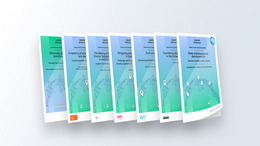Although a third of respondents in Germany believe that the main responsibility for mitigating disinformation lies with political decision-makers, only 13 per cent trust politicians to actually achieve improvements. Citizens themselves (20 per cent) and the media (17 per cent), on the other hand, are perceived as more competent. A fifth of respondents (22 per cent) believe that the platforms are responsible, but only 10 per cent believe that they can actually solve the problem. When it comes to the question of users' personal responsibility, there is a clear difference to the USA: while 22 per cent of respondents there believe that citizens themselves have a duty to take action against disinformation, this figure is only 9 per cent in Germany.
![[Translate to English:] Twi white hands holding a smart phone. On the Screen it says "Alert. This content has been flagged by independent fact-checkres. Proceed with caution before sharing."](/fileadmin/files/_processed_/1/7/csm_AdobeStock_128798646_KONZERN_ST-DZ_Office_ef75b47a66.jpg)
Montage © Upload image - stock.adobe.com
Preventive, reactive, restrictive? Measures against disinformation from the perspective of the population in Germany and the USA
The year 2024 is characterised by numerous important elections worldwide, including the upcoming presidential election in the USA. In this context, the manipulation of public opinion through disinformation on the internet is becoming increasingly important. Back in February 2024, our study ‘Disconcerted public’ showed that many people in Germany and the USA are worried and feel unsettled by disinformation. In our newly published study ‘Preventive, reactive, restrictive?’, we have now investigated who citizens believe is responsible for taking action against disinformation, what measures they consider useful, and what they attach particular importance to.
The majority want access to correct information
A majority of respondents in Germany expressed a desire for better protection against disinformation. 57 per cent state that citizens should only have access to correct information on the internet. In contrast, 34 per cent believe that people should be allowed to say and write anything they want on the internet. Even when it comes to controversial topics such as the war in Ukraine, immigration and climate change, the desire for correct information prevails. With 61 per cent agreeing, women also consider protection from false information to be more important than men. A comparison with the USA shows that the balance there is less clear-cut: 47 per cent of US respondents prefer accurate information online, while 44 per cent consider it more important to be able to say anything, regardless of its truthfulness.
Citizens want more protection from false information, and politicians should take this seriously. But at the same time, we must not fall into blind ‘action-ism’ - we need a well-balanced legal framework that harmonises the fight against disinformation campaigns with the protection of freedom of expression as a cornerstone of our democracy.
Dr Kai Unzicker, expert on democracy and social cohesion
Politicians should become more active, especially in promoting media literacy
The respondents in the study predominantly rate the measures listed for dealing with disinformation positively. In particular, the deletion of demonstrably false claims (69 per cent) and the correction of such information (66 per cent) are met with broad approval. Blocking actors who spread disinformation (61 per cent) is also supported by the majority.
Large majorities call for political action: 87 per cent of respondents believe that politicians should promote media literacy and educate people about disinformation. Similarly, 82 per cent support stricter enforcement measures for infringements by platforms and 80 per cent see a need for more police and judicial staff to tackle hate and disinformation online.
In sum: Recommended actions for politics, society, citizens, and the media
The results of the study make it clear that the population would like to see more measures to deal with disinformation properly. However, there is a lack of confidence that political decision-makers and platforms can implement this effectively on their own. This is why a society-wide approach is needed that holds politicians, citizens, the media, and platforms equally accountable.
In order to regain trust, political decision-makers must prove that they can successfully remedy grievances: Democracy needs to be prioritised in words and deeds. Our digital discourse can be strengthened, and the challenges posed by disinformation effectively countered as long as policymakers take a globally networked, coordinated, and participatory approach.
Cathleen Berger, expert for future technologies and sustainability
The following is important:
1. Decisive political action that does not get bogged down in ‘action-ism’, but plans for the long term: Support for independent research, capacity building for analysis and transparent advice and, in particular, the promotion of media skills must take centre stage. If politicians succeed in consistently enforcing existing regulations and creating independent institutions, trust and resilience can grow in the long term.
2. Actively involve citizens: This requires comprehensive education about the mechanisms of disinformation and the promotion of individual skills in dealing critically with digital content - for all generations and social groups.
3. Strengthen journalism: Media houses must take their role as guardians of democracy seriously by reporting transparently and fact-based without exception and actively exposing and correcting disinformation.
4. Hold platforms to account: Technology companies such as Meta and TikTok should not only improve their moderation measures, but also invest in tools that help users to better recognise disinformation. The introduction of transparent labelling systems for manipulated or AI-fabricated content is a first step in this direction.
Authors
Lukas Bernhard and Leonie Schulz from pollytix strategic research and Cathleen Berger and Kai Unzicker from the Bertelsmann Stiftung.
Method and background
For the study, 5,055 people aged 16 and over were surveyed online in Germany and 2,018 in the USA. The survey was conducted by pollytix strategic research gmbh on behalf of the Bertelsmann Stiftung between 4 and 17 October 2023. The data is weighted and the margin of error is 1.4 (Germany) and 2.2 (USA) percentage points. Initial results from this survey are already included in the study ‘Disconcerted Public’ published in February 2024.









